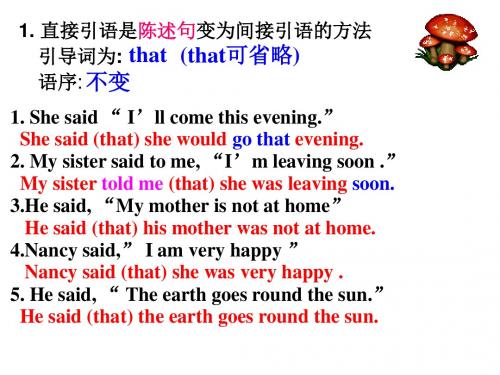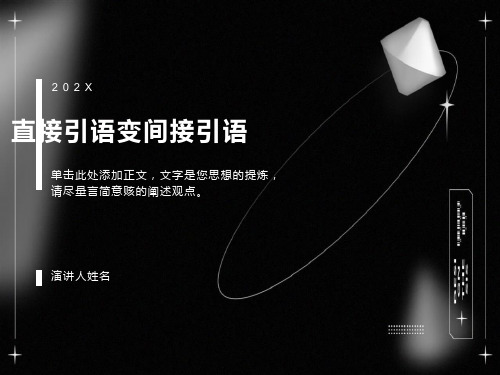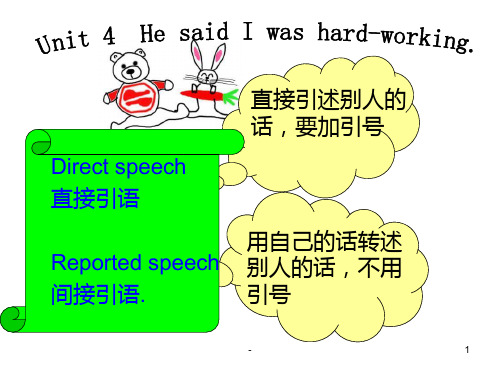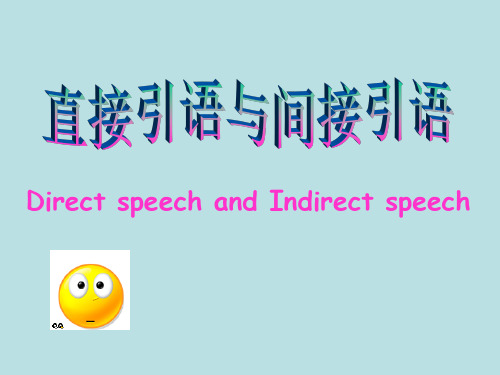直接引语变间接引语-公开课
直接引语变间接引语经典课件

总之:人称的变 化要符合逻辑!
直接引语→间接引语:时态的变化 (1) 一般现在时变为一般过去时 (2) 现在进行时变为过去进行时
(3) 一般将来时变为过去将来时
(4) 现在完成时变为过去完成时
(5) 一般过去时变为过去完成时
(6) 过去完成时不变,仍为过去完成时
时态不变化:
①直接引语是客观真理 “The moon moves around the earth”, the teacher told me. → The teacher told me the moon moves around the earth. ②直接引语是过去进行时,时态不变 Jack said, “John, where were you going when I met you in the street?” →Jack asked John where he was going when he met him in the street.
“You have finished the homework, haven’t you?” my mother asked. →My mother asked me whether I had finished the homework.
③直接引语如果是特殊问句,间接引语应该 改为由疑问代词或疑问副词引导的宾语从句 (宾语从句必须用陈述句语序)。 She asked me, “When do they have their dinner?” → She asked me when they had their dinner.
“Do you like singing?”
What did he say
?
He asked
直接引语和间接引语(公开课)

间接引语(indirect speech)
直接引语变间接引语面面观
一、如何变人称:
a.从句是第一人称或被第一人称所修饰时。
1. She said. “My brother wants to go shopping with me. ” She said her brother wanted to go shopping with her . 2. He says, “ I am tired.” he is tired. He says
now ---- then today ---- that day yesterday --- the day before last week ---- the week before three days ago ---- three days before tomorrow ---- the next day next week ---- the next week
直接引语(direct speech)
She said that they had only one earth. They must keep their environment clean and tidy. They must try their best to protect her, and make their home more beautiful.”
1. He said,“I do it,”.
练 兵 场,小试身手二
---- He said that he did it. 2. “I have seen her before,” said he.
---- He said he had seen her before. 3. “I’m making coffee for you all,” she said. ---- She said she was making coffee for us all. 4. He said: “We will start tomorrow.”
直接引语变间接引语经典课件公开课可用

02
had finished
Mike said he ____________ his homework.
5.Mike said, “I have finished my homework.”
The boy said that he ________ a pilot. would be
2.“I took it home with me,” she said.
02
told had found his had taken
3. The teacher said, “The sun rises in the east and goes down in the west.” The teacher said the sun ______ in the east and ______ down in the west. 4. “I met her at school.” he said to me. He ______ me he ______ met her at school. 5. Peter said, “I worked in Africa in 2010”. Peter said he ______ in Africa in 2010.
What did she say ?
He said
he had become a doctor a week before.
What did he say ?
I have become a doctor a week ago.
小结直接引语→间接引语:时间状语变化
now 现在 then 那时
直接引语变间接引语讲解课件

“Areked me
Whether / if I was ready.
“Do you know my name?”
She asked me
是否 Whether / if
I knew her name.
“Can you help me?”
She asked me
“What are you doing?”
She asked me
what
I was doing.
“How does she go to school?”
She asked me
how
She went to school.
“Why do you like English?”
He asked me
1. 直接引语是陈述句变为间接引语的方法 引导词为: that (that可省略) 语序: 不变
1. She said “ I’ll come this evening.” She said (that) she would go that evening. 2. My sister said to me, “I’m leaving soon .” My sister told me (that) she was leaving soon. 3.He said, “My mother is not at home” He said (that) his mother was not at home. 4.Nancy said,” I am very happy ” Nancy said (that) she was very happy . 5. He said, “ The earth goes round the sun.” He said (that) the earth goes round the sun.
高一英语《直接引语变间接引语》PPT课件

(如果转述发生在当天、当地的事,引语中的(come, here, today, this morning, yesterday,tomorrow)等不必改变: b’s wife said, “Bob, you forgot your wallet this morning.” ob’s wife told Bob that he forgot his wallet this morning.
直接引语变间接引语
202X
单击此处添加正文,文字是您思想的提炼, 请尽量言简意赅的阐述观点。
演讲人姓名
1.时态变化
.一般现在时变一般过去时: e girl said, “I'm sorry for being late for class.” he girl said that she was sorry for being late for class.
③.一般将来时变过去将来时:
e said. “I have lost a pen.” he said that she had lost a pen
01
e said to me, “I’m studying Japanese these days.” he told me that she was studying Japanese those days.
2).“二随宾”是指引号内的主语及宾语是第二人称或被第二人称修饰,变间接引语时,人称要变成引号外的宾语人称。如果引号外没有宾语,也可以用第一人称。如: ①.She said to me, “Are you interested in science?” →She asked me if I was interested in science. ②.He said to Kate. "How is your sister now?" →He asked Kate how her sister was then.
直接引语变间接引语(完整)PPT课件

CHENLI
17
二、间接叙述转换为直接叙述
(1)改标点,改逗号为冒号,添加引号。 (2)改人称如果转述内容中是第三人称“他 (她)”或“他(她)们”,应改为“我”或 我(们)”;如果在转换时遇到一个句子中有两个 第一人称“我”时,应改后面的一个“我”为第二 人称“你”。
CHENLI
18
例:姐姐说,她明天送给我一件生日礼物。 改为:姐姐说:“我明天送给你一件生日礼物。
9、老师对王小宁说:“我有事,你组 织同学们继续完成制作。”
10、王明再也忍不住了,抢着对老班长 说:“我帮你一起找,我找得见。”
CHENLI
16
8、老师严厉地对小敏说,他必须把教室打扫干净。
9、老师对王小宁说,他有事,王小宁组织同学们继续 完成制作。
10、李明再也忍不住了,抢着对老班长说,他我帮老班 长一起找,他找得见。
CHENLI
19
1、妈妈问小宁他昨天去了哪里,她找了 他一整天。
妈妈问小宁:“你昨天去了哪里?我找 了你一整天。”
2、小方说,不行,他的字写得不够好, 应该让小宇去参加比赛。
小方说:“不行,我的字写得不够好,
应该让小宇去参加比赛。”CHENLI
20
3、王兰告诉我,我作文比赛得了一等奖。
4、王刚对李明说,他的鞋破了,脚掌也 出血了,他实在走不动,让李明自己先 走吧!
CHENLI
21
3、王兰告诉我,我作文比赛得了一等奖。
王兰告诉我:“你作文比赛得了一等奖。”
4、王刚对李明说,他的鞋破了,脚掌也 出血了,他实在走不动,让李明自己先 走吧!
王刚对李明说:“我的鞋破了,脚掌也
出血了,我实在走不动,你自己先走吧!”
CHENLI
直接引语变间接引语讲解课件

4. “How do you go to school?.”
He asked how you went to school. 5. “Who is singing?” He asked who was singing. 6. “When do you get up?”
He wanted to know when I got up.
where I was Shirley asked ________ _____ _____ born.
4. “ What’s wrong with you?” Lily asked me.
what was wrong me Lily asked me ______ _____ _______ with _____.
1. 直接引语是陈述句变为间接引语的方法 引导词为: that (that可省略) 语序: 不变
1. She said “ I’ll come this evening.” She said (that) she would go that evening. 2. My sister said to me, “I’m leaving tomorrow.” My sister told me (that) she was leaving the next (following) day. 3.He said, “My mother is not here now.” He said (that) his mother was not there then. 4.Nancy said,” I am very happy today.” Nancy said (that) she was very happy that day. 5. He said, “ The earth goes round the sun.” He said (that) the earth goes round the sun.
高一直接引语转间接引语公开课

公开课教案年级高一课题直接引语转成间接引语授课老师林顺教学目标1.掌握陈述句、疑问句、祈使句如何转换成间接引语。
2.注意直接引语转成间接引语时句式、人称、时态、指示代词、时间状语、地点状语和动词的变化3.应用所学知识,解决相关的练习题。
教学重难点1.直接引语变为间接引语时时态不作改变的情况。
2.疑问句和祈使句如何转换成间接引语。
教学方法问答法、讲授法教学用具白板、及相关材料教学过程Step1.Warming-up:定义:引用别人的话有两种方式,一种是讲述别人的原话,并把它放在引号里,这叫直接引语(direct speech );例:He said:" It is too late."另一种是用自己的话来转述别人,并且不能用引号,这就是间接引语。
(indirect speech)例:He said(that) it was too late.这两种引语都是宾语从句,但是直接引语放在引号内,不用连词联接;间接引语不用引号,通常用连接词与主句联接。
Step2.Lead-in:一、直接引语变间接引语时句式的变化1.陈述句变为以that 引导的宾语从句例如:He said, “I'm very glad.”→He said that he was very glad.2.一般疑问句变为if(whether)引导的宾语从句。
例如:He said, “Can you come this afternoon,John?”→He asked whether (if) John could come that afternoon.3. 特殊疑问句变为由who, what, when等疑问词引导的宾语从句例如:He said, “Where is Mr.Wang?”→He asked where Mr. Wang was.二、人称的变化【点拨】人称的变化一般遵循“一同主,二随宾,三不变”这一原则,例如:“一随主”是指在直接引语变间接引语时,如果从句中的主语是第一人称或被第一人称所修饰。
直接引语变间接引语精华版PPT课件

He said, “I want to go swimming now. ”
→ He said he wanted to go swimming then.
地点状语,尤其表示方向性的,
here 变 there
The teacher said ,“ You should come here at 7:00.”
现在进行时
过去进行时
He said, “I'm eating an apple.” → He said that he was eating an apple.
一般将来时
过去将来时
Tom said to me “I’ll go to Shanghai next week” Tom told me that he would go to Shanghai
直接引述别人的 话,要加引号
Direct speech 直接引语
用自己的话转述
Reported speech 别人的话,不用
间接引语.
引号
-
1
直接引语变间接引语,即变为宾语从句主要需要 注意以下五点: 1.宾语从句必须用陈述语序。 2.主句时态决定从句时态:如果主句为一般现在时, 从句可以用任何时态(原题给的啥时态就用啥时态); 如果主句为一般过去式,从句必须要用所给时态的 对应的过去式。 3.引导词。 4.人称的转换。 5.时间状语的转换。
C. whether he'll come D. if he comes 2. Could you tell me ___D______ the nearest hospital is?
A. what B. how C. whether D. where
3. Tom asked my friend ____D____.
直接引语变间接引语讲解课件

转换的基本原则
准确转述
用自己的语言准确转述 说话人的意思,不改变
原意。
调整时态
根据上下文语境,调整 时态以符合整体语境。
调整人称
根据需要,将直接引语 中的第一人称或第二人
称转换为第三人称。
去除无关细节
去除直接引语中与主要 信息无关的细节,使转
述更加简洁明了。
02
CATALOGUE
直接引语变间接引语的步骤
标点符号的转换
01
直接引语中的冒号和双引号需转 换为间接引语中的逗号和单引号 。
02
例如:“I will go to the park tomorrow.” -> He said that he would go to the park the next day.
人称代词的转换
直接引语中的第一人称代词需转换为 第三人称代词。
详细描述
在直接引语转变为间接引语的过程中,标点符号的使用需要特别注意。例如, “他说‘我明天去北京’”应该使用逗号变为“他说,明天他要去北京”。
语序混乱
总ቤተ መጻሕፍቲ ባይዱ词
在将直接引语转变为间接引语时,语序 混乱也是一个常见错误。
VS
详细描述
在直接引语中,原话的语序可能是倒装、 前置等,但在转变为间接引语时,需要按 照正常的语序进行排列,以保持句子的通 顺性和逻辑性。例如,“明天你去北京吗 ?”应该转变为“他问是否明天去北京” 。
04
CATALOGUE
练习与巩固
单句改写
详细描述:从简单的单句开始练 习,逐步掌握直接引语变间接引 语的规则和技巧,如时态、语序 、人称等方面的变化。
例子
原句:他说:“我喜欢吃苹果。 ”
直接引语变间接引语 公开课ppt课件

3 Father asked Anne, “Why did you go to bed sFoatlhaetre alsaksetd nAingnhet?W”hy she had gone to
bed so late the night一般be过fo去re时. 过去完成时
直接变间接,时态向后退一步
down a series of facts in a diary.” direct
Anne said that she didn’t wasnpteetcoh
set down a series of facts in a
di1ar引y.号”
indirect speech
2 时态
3 人称
Definition:
3 Father asked Anne, “Why did you go to be so late last night?”
Father asked Anne Why she had gone to bed
Direct speech
Indirect speech
statement said (to sb)/told sb. (that)+陈述句语序
直接引语 direct speech 一般现在时 现在进行时 现在完成时 一般过去时
一般将来时 过去完成时
间接引语 indirect speech 一般过去时 过去进行时 过去完成时 过去完成时
过去将来时 过去完成时
Special cases(特殊情况): 1“The earth moves around the sun.”
Unit 1 Friendship
Grammar
Direct and Indirect Speech Ⅰ :statement and questions
直接引语变间接引语经典课件 公开课可用

2. “I don’t want to go there with Alice,”
said Tom. didn’t want to go Tom said that he ______
there with Alice.
直接引语→间接引语:时间状语变化
补充: 直接引语
地点 状语
间接引语
there 那里 that 那 those 那些 go 去 take 拿去
here 这里
this 这 these 这些 come 来 bring 带来
指示 代词
动词
Practice
He said, “I lost a key here yesterday.” He said that he had lost a key there the day before.
Grammar and usage
Direct speech & reported speech
Enjoy the following story
It was the first day for Xiaoming to go to school. After school, his father asked Xiaoming what he learned that day. Xiaoming said,“I learned she, you and I”. Then his father asked how the teacher explained that. “She is your deskmate.” Xiaoming answered happily, pointing to her mother. “You are my student, I am your teacher.” The father became angry, and said, “she is your mother, you are my son, I am your father.” The next day, in class, the boy went to the teacher and told the techer his puzzle, and he said to the teacher,“She is your mother.” Pointing to his deskmate, “You are my son. I am your father.”
小学语文句式转换复习名师公开课获奖课件百校联赛一等奖课件

将下列反问句改为陈说句
1、我们怎能容忍这种不文明旳行为呢? 改:我们不能容忍这种不文明旳行为。 2、我们怎么能让时间从我们身边急忙溜走呢? 改:我们不能让时间从我们身边急忙溜走。 3、伟大旳祖国诞生了,中国人民怎能不感到欢欣鼓
舞呢? 改:伟大旳祖国诞生了,中国人民感到欢欣鼓舞。
大笑。
把字句变被字句措施:
首先将”把“前面主语放在“把”旳背面, “把”背面旳宾语放在“把”旳前面。
然后将“把”换成“被”
将被字变成把字句
首先将被前面旳宾语放在“被”旳背面,“被” 背面主语旳放在“被”旳前面;
然后将“被”换成“把”。
❖ 1、“把”字句与“被”字句旳转换练习: ❖ a. 我把这幅画挂在书桌前,数年来不曾换样。 ❖ b. 睡梦中旳小芳被一阵清脆旳铃声惊醒了。 ❖ 2、将下面陈说句改为反问句 ❖ a我们劝阻同学吵架是正确。 ❖ b每个人读了这个故事都会受感动。 ❖ 3、反问句改为陈说句练习 ❖ a你看,烈日当空,连树上旳叶子都晒蔫了,这不 就是对
陈说句改为反问句旳措施:
1 将肯定句中旳肯定词(是能会等)改为否定词(不 是不能不会等);或将否定句中旳否定词(不是不 能不会等)改为肯定词(是能会等);
2 在肯定词或否定词前加“怎、怎么、难道、岂”等 反问语气词;
3 在结尾加上疑问助词“呢、吗”等 ,句号改为问号。
一般句式、把字句、被字句之间旳转换
了诸葛亮。
间接论述变为直接论述旳措施
一、首先在论述内容前面加冒号以及针对论述 内容引号;
二、变论述内容中第三人称旳“他”或“她”, 为第一人称旳“我”。
反问句改为陈说句旳措施:
1、将反问句中肯定词或否定词前旳“怎、怎么、 难道、岂”等反问语气助词去掉。
直接引语变为间接引语ppt课件

从使用情况来看,闭胸式的使用比较 广泛。 敞开式 盾构之 中有挤 压式盾 构、全 部敞开 式盾构 ,但在 近些年 的城市 地下工 程施工 中已很 少使用 ,在此 不再说 明。
For example:
For example: 1. "Open the door,please."She said.
She asked me to open the door.
2. It says,"No smoking here." It told us not to smoke there.
从使用情况来看,闭胸式的使用比较 广泛。 敞开式 盾构之 中有挤 压式盾 构、全 部敞开 式盾构 ,但在 近些年 的城市 地下工 程施工 中已很 少使用 ,在此 不再说 明。
时态的变化
当主句是过去时时,从句要得变为相应的过去时态, 变化规律如下:
一般现在时—— 一般过去时 一般过去时—— 过去完成时 一般将来时—— 过去将来时 现在进行时—— 过去进行时 现在完成时—— 过去完成时 过去完成时—— 过去完成时(时态不变) 过去进行时—— 过去进行时(时态不变)
从使用情ቤተ መጻሕፍቲ ባይዱ来看,闭胸式的使用比较 广泛。 敞开式 盾构之 中有挤 压式盾 构、全 部敞开 式盾构 ,但在 近些年 的城市 地下工 程施工 中已很 少使用 ,在此 不再说 明。
English teacher. 另外注意直接引语为复数,引述者主语为单数,间接引语主语相应变复
数。如: He said,“Are you interested in English?”→He asked me/us if I
直接引语变间接引语-宾语从句-公开课

4. The teacher said, “The sun rises in the east and goes down in the west.”
The teacher said that the sun _r_i_s_e_s_ in the east and _g_o_e_s__ down in the west. 5. “I met her yesterday,” he said to me.
直接引语与间接引语
引述某人的话一般采用两种形式: 一种是直接引语(direct speech), 即原 封不动地引用原话,把原话放在引号内; 一种是间接引语(indirect speech),即 用自己的话加以转述,被转述的内容不 放在引号内。
The boy said, "I am smart."
Tom asked Ann, “Do you like apples?”
Tom asked Ann if she liked apples.
If vs. whether
• I don't know whether/if they will come to help us.(一般情况下可以通用)
• I don't know whether or not they will come for our help.(whether or not/ whether...or not)
→She said that their bus would arrive in five minutes.
②直接引语如果是一般疑问句,间接引语应改 为由whether或if引导的宾语从句. 但用陈述句 语序
He said, “Can you swim, John?” →He asked John if he could swim.
英语:直接引语变间接引语课件

随 称变间引后与主 “ you must get she must get up
宾 句宾语的人称保 up early”
Hale Waihona Puke early持一致第三 人称 不用 变
引号内的第三人 称在变间引后去人 称不变
She said to me , “ They want to help him”
She told me that they wanted help him
4. This morning he said,” I’m leaving for Beijing tomorrow.” This morning he said that he was leaving for Beijing tomorrow.
直接引语转为间接引语时,下列情况下时态不变
1. 直接引语若表示的是客观事实或真理时, 变间接引语时时态不变.
Direct speech and Indirect speech
He says,“I leave my book in your room” He said that he left his book in your room.
直接引语: 直接引述别人的原话 间接引语: 用自己的话转述别人的话
间接引语在多数情况下构成宾语从句
5. He said, “they are playing games over there?” He said that they___w__e_re_ playing games over there.
直接引语时态 一般现在时 现在进行时 现在完成时 一般过去时 过去完成时 一般将来时
间接引语时态 一般过去时 过去进行时 过去完成时 过去完成时 不变 过去将来时
- 1、下载文档前请自行甄别文档内容的完整性,平台不提供额外的编辑、内容补充、找答案等附加服务。
- 2、"仅部分预览"的文档,不可在线预览部分如存在完整性等问题,可反馈申请退款(可完整预览的文档不适用该条件!)。
- 3、如文档侵犯您的权益,请联系客服反馈,我们会尽快为您处理(人工客服工作时间:9:00-18:30)。
一般将来时 过去将来时
3 Father asked Anne, “Why did you go to bed so late last night?” Father asked Anne Why she had gone to bed so late the night before. 一般过去时 过去完成时
1 She said , “I’m going to Beijing.” 陈述句 She said that she was going to Beijing
2 Anne asked,“Do you want a friend whom you
could tell everything to?”
一般疑问句
Unit 1 Friendship
Grammar
Direct and Indirect Speech Ⅰ :statement and questions
Can you find the differences between these two sentences?
Anne said,“I don’t want to set down a
C. we looked…that day D. I looked…that day
Picture 5
Pair work. GM: what’s the weather in Beijing tomorrow? I can’t hear the man
10points clearly on the TV.
indirect speech.(说出2条直接引 语变间接引语的规则。)
Picture 9
Share one story about your friends and ask three classmates to change one
3 points street ___.
A. we were walking…then B. you are walking…now C. they were walking…then D. they walking…now
Picture 7 Write one question on the blackboard and ask one classmate to answer. Try
His friends asked him, “Will you go to Dalian?”
Picture 2 Translation sentences.
1 她告诉我她一个小时前回来的。
She told me that she had come back an hour before.
9 points 2 导游说这座桥于1980年完工。(完工 complete)
8 points to change his/her answer into
indirect speech. (将一个问题写在黑板上,指定一个 同学回答,并将该同学的答句变为 间接引语。)
Picture 8
Speak out four rules about the
4 points direct speech changing into the
状 语
Last week/month
That week/month before
three days ago three days before
tomorrow
the next day/the following day
Direct Speech Indirect Speech
地点状语 Here
there
direct speech(直接引语):
直接引用别人原句,并放在引号里
indirect speech (间接引语): 用自己的话转述别人的话
How to change sentences
from direct speech into indirect speech?
1 Sentence Structure 句子结构
Anne said that she didn’t want to set down a series of facts in a diary.” 一般现在时 一般过去时
2 She said , “I’m going to Beijing.”
She said that she was going to Beijing
come
go
方向性动词 bring
take
borrow lend
Summary:
一看结构
直接变间接 二看时态
1 said (to sb)/told sb. (that)+陈述语序
2 asked whether/if +陈述句语序
3 asked wh-word +陈述句语序
时态向后退一步
三看人称 一随主,二随宾,三不变
series of facts in a diary.”
direct speech
Anne said that she didn’t want to set down
a series of facts in a diary.”
1 引号 2 时态 3 人称
indirect speech
Definition:
3 Father asked Anne, “Why did you go to bed so late last night?” Father asked Anne Why she had gone to bed so late the night before.
Direct speech
Indirect speech
the teacher told me.
The teacher told me that the earth moves around the sun .
2 Tom said,“I was born on April 21,1980.”
Tom said he was born on April 21,1980. 直接变间接,时态向后退一步 若遇过时真理,时态无须变
Anne asked us if/whether we wanted a friend
whom we could tell everything to.
3 Father asked Anne, “Why did you go to bed
so late last night?”
特殊疑问句
Father asked Anne Why she had gone to bed
Tom said that he would see me the next day
Picture 4
Jack said to me, “You look worried today.”
Jack told me that _D__ worried ___.
A. he looks…today
1 point B. you look…today
选择你喜欢的图片,回答问题正确得到 所给的分数,答错,零分。最高分10分。
1
2
3
4
5
6
7
8
9
Picture 1
Please change this sentence into direct speech or indirect speech.
3 points His friends asked him if he would go to Dalian.
True
Picture 3 Fill in the blanks.
1. He said, “I haven’t heard from him
since May.”
8 points he hadn’t heard
He said that
from him since May.
.
2. Tom said “I will see you tomorrow.”
GC: that’s right, I can help. The man said…
GM: what did he say about shanghai? GC: … … GM: Thank you. You’ve been very
helpful.
Picture 6
1. We said to her, “They’re walking through the street now.” We told her that ___C_ through the
直接变间接,时态向后退一步
直接引语 direct speech 一般现在时 现在进行时 现在完成时 一般过去时
一般将来时 过去完成时
间接引语 indirect speech 一般过去时 过去进行时 过去完成时 过去完成时
过去将来时 过去完成时
Special cases(特殊情况): 1“The earth moves around the sun.”
so late the night before.
1 She said , “I’m going to Beijing.” She said that she was going to Beijing.
2 Anne asked,“Do you want a friend whom you could tell everything to?” Anne asked us if/whether we wanted a friend whom we could tell everything to.
